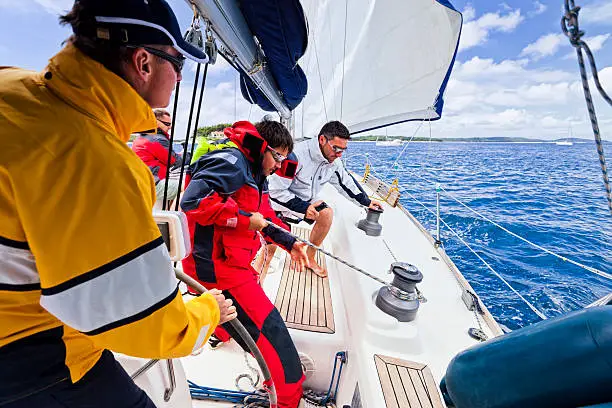Crafting the Ideal Job Description for a Deckhand/Ordinary Seaman (OS)

Page Contents
Introduction
A career at sea as a Deckhand or Ordinary Seaman (OS) offers adventure, challenges, and the opportunity to be part of a vital industry that keeps global trade flowing smoothly. As the backbone of maritime operations, a well-defined job description for a Deckhand/OS is essential for attracting qualified candidates who are eager to embark on a rewarding maritime career.


Job Title: Deckhand/Ordinary Seaman (OS)
Job Overview
As a Deckhand/Ordinary Seaman (OS), you will play a crucial role in supporting the safe and efficient operation of vessels at sea. Reporting to the Captain or senior officers, you will perform a variety of duties essential to maritime operations, including deck maintenance, cargo handling, and navigation assistance. This position requires physical fitness, strong teamwork skills, and a commitment to safety.
The Five (5) Key Responsibilities
- Deck Maintenance:
- Perform routine maintenance tasks, such as cleaning, painting, and repairing decks, hulls, and superstructures.
- Assist with the inspection, maintenance, and repair of navigational equipment, life-saving appliances, and firefighting equipment.
- Ensure compliance with safety and environmental regulations related to vessel maintenance.
- Cargo Handling:
- Assist in loading and unloading cargo, ensuring proper stowage and securing of goods to prevent damage during transit.
- Operate winches, cranes, and other equipment to facilitate cargo handling operations.
- Maintain accurate records of cargo movements, including quantities, destinations, and handling procedures.
- Navigation Assistance:
- Stand watch as directed by senior officers, maintaining a lookout for other vessels, navigational hazards, and changes in weather conditions.
- Assist with the operation and maintenance of navigational aids, such as radar, GPS, and electronic chart systems.
- Execute helm and lookout duties under the supervision of licensed officers, following established procedures and safety protocols.
- Emergency Response:
- Participate in emergency drills and exercises, including fire drills, abandon ship procedures, and man-overboard drills.
- Respond promptly to emergency situations, following established protocols and procedures to ensure the safety of crew and vessel.
- Maintain proficiency in the use of life-saving equipment and emergency response techniques.
- Teamwork and Collaboration:
- Work closely with fellow crew members to accomplish tasks safely and efficiently.
- Communicate effectively with officers, engineers, and other crew members to coordinate activities and ensure smooth operation of the vessel.
- Foster a positive and inclusive work environment, contributing to a culture of professionalism, respect, and teamwork.
The Seven (7) Qualifications and Skills:
- High school diploma or equivalent required; additional maritime training and certifications preferred.
- Physical fitness and stamina to perform duties in a challenging maritime environment.
- Strong swimming skills and knowledge of basic seamanship principles.
- Ability to work effectively as part of a team and follow instructions from senior officers.
- Familiarity with safety procedures and regulations governing maritime operations.
- Willingness to work long hours, including nights, weekends, and holidays, in all weather conditions.
- Excellent communication and interpersonal skills.
The Salary Scale as of 2024
The salary scale for an Ordinary Seaman (OS) or Deckhand typically varies depending on factors such as the length of experience, type of vessel be it a luxury or a cargo or oil tanker, shipping lines company and geographical location. On average, entry-level OSs can expect to earn between $25,000 to $35,000 per year, with opportunities for advancement and increased earning potential with additional experience and certifications.
Experienced OSs may earn salaries ranging from $35,000 to $50,000 annually, while those with specialized skills or working on larger vessels or in high-demand sectors such as offshore oil and gas exploration may command higher salaries, often exceeding $50,000 per year.
Additionally, most of the employers may offer benefits such as housing, meals, and health insurance as part of the compensation package.
Note: Employee benefits for vessel crew members can vary depending on the employer, the type of vessel, and the specific terms of employment.
Here are Some Common Benefits that International Vessel Crew Members may Receive:
- Housing: Some employers provide accommodation on board the vessel for crew members during their work rotations. These accommodations may include individual cabins or shared living quarters, depending on the size and type of vessel.
- Meals: Crew members typically receive meals while on duty, with the cost covered by the employer. Meals are usually provided by onboard catering staff or prepared in the vessel’s galley (kitchen).
- Health Insurance: Many employers offer health insurance coverage for their crew members, which may include medical, dental, and vision insurance. This coverage helps ensure that crew members have access to necessary healthcare services while at sea or during port visits.
- Retirement Benefits: Some employers offer retirement savings plans or pension schemes for their crew members, helping them save for their future financial security.
- Paid Time Off: Crew members may be entitled to paid vacation days or leave periods, allowing them to take time off from work to rest and recharge. The amount of paid time off may vary depending on factors such as length of service and employment contract terms.
- Training and Certification: Employers may provide opportunities for crew members to receive training and obtain additional certifications relevant to their roles and career advancement. This may include safety training, specialized skills training, or courses to obtain higher-level maritime certifications.
- Travel Benefits: Depending on the nature of the vessel’s operations, crew members may have the opportunity to travel to different ports and destinations around the world as part of their job. Some employers may provide travel allowances or reimbursements for crew members’ transportation costs to and from the vessel.
- Employee Assistance Programs (EAPs): EAPs may be available to provide confidential counseling and support services to crew members facing personal or professional challenges while at sea or on shore leave.
Overall, these employee benefits help to support the well-being, safety, and job satisfaction of vessel crew members, contributing to a positive work environment and ensuring the continued success of maritime operations.
Conclusion
A career as a Deckhand/ Ordinary Seaman (OS) offers an exciting opportunity to be part of the dynamic maritime industry. By outlining clear job responsibilities and qualifications, employers can attract talented individuals who are eager to contribute to the success of their vessel and crew. With a commitment to safety, teamwork, and professionalism, Deckhands/OSs play a vital role in ensuring the smooth and efficient operation of vessels at sea.







